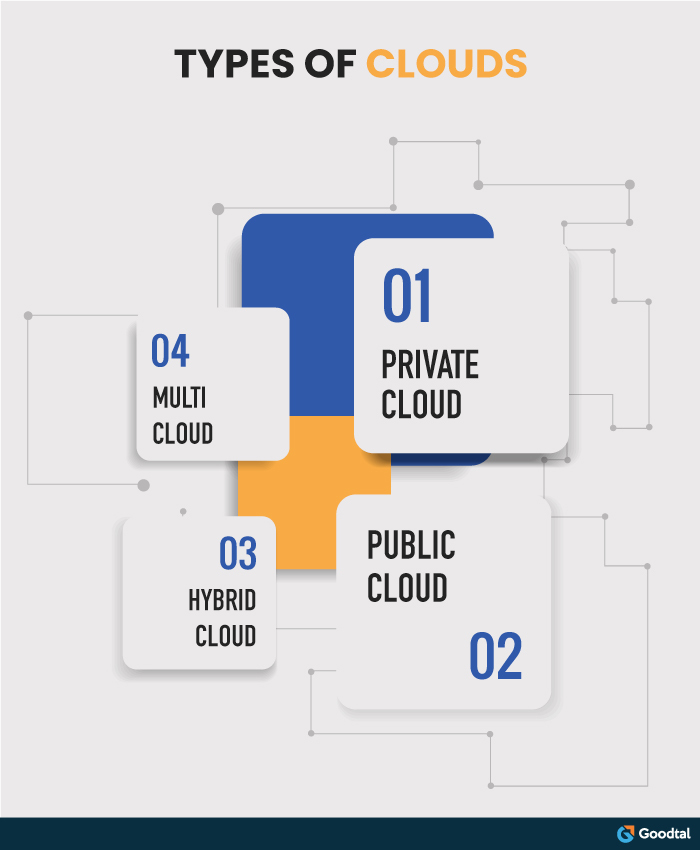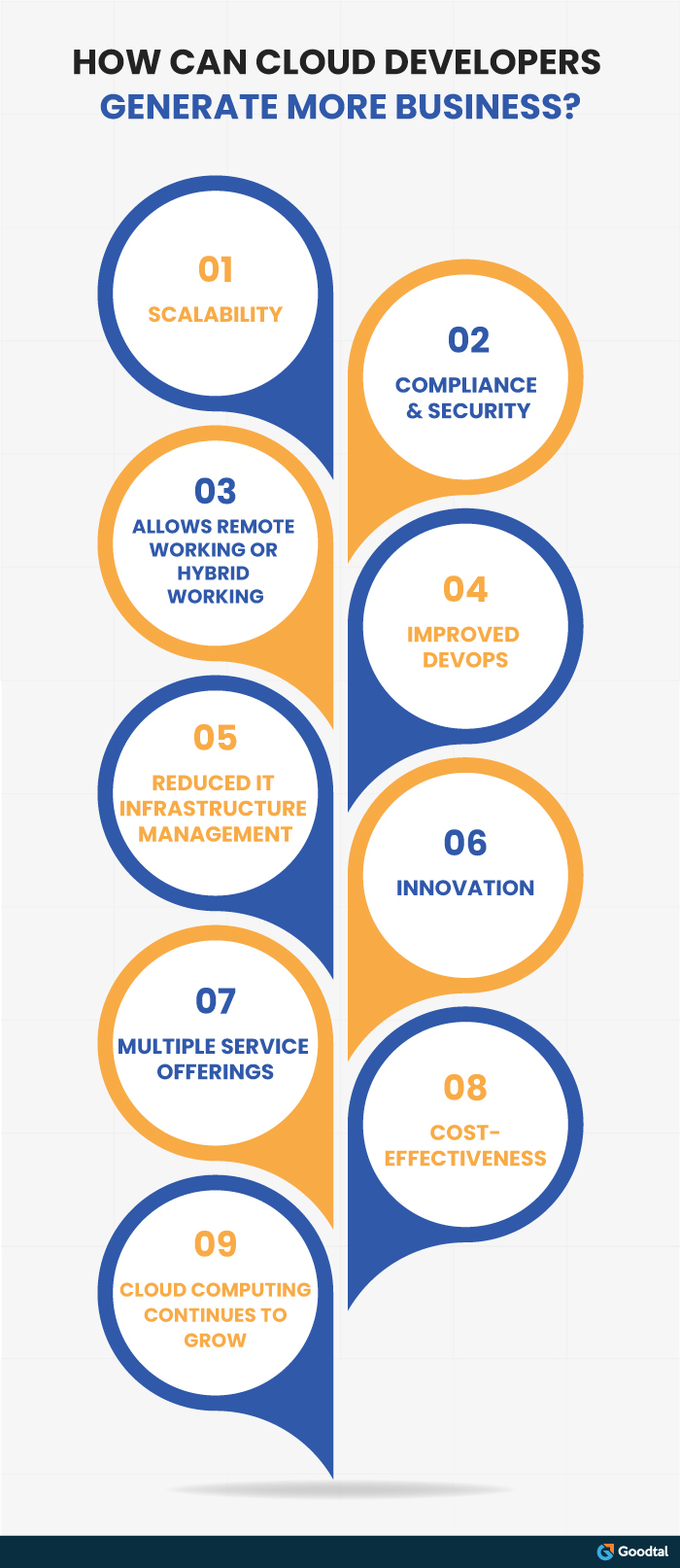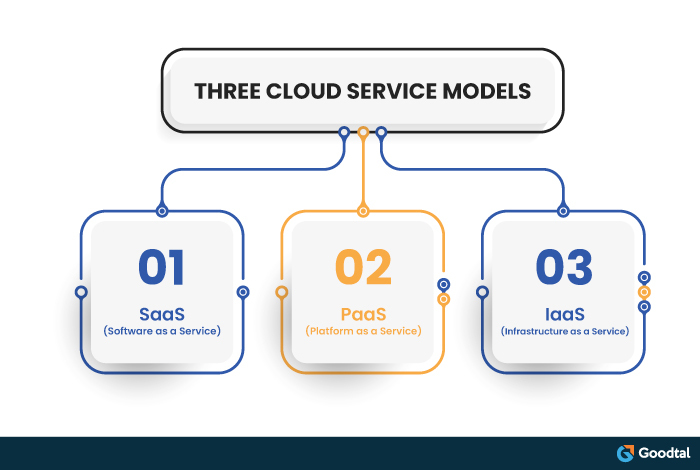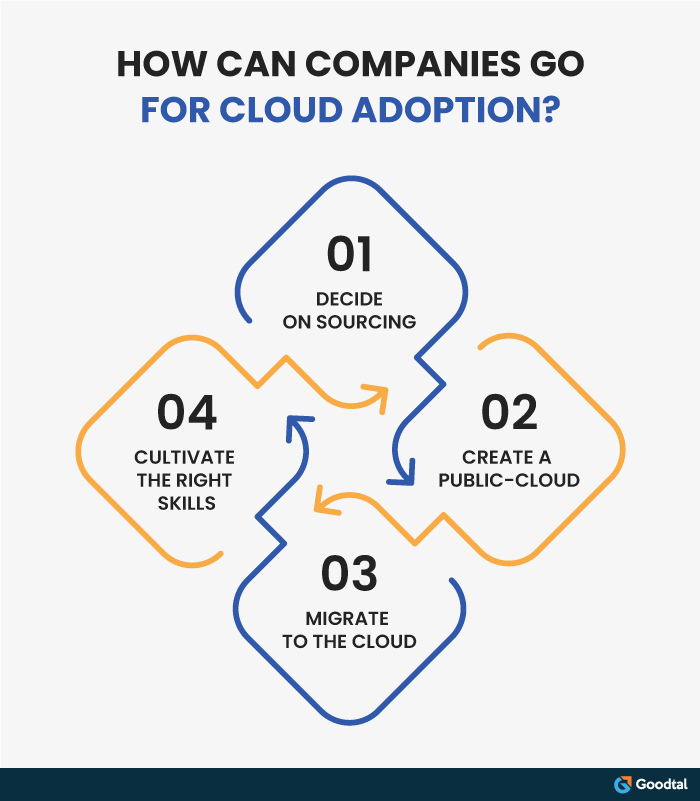
Cloud computing is all about accessing softwares & databases that are hosted on servers and accessible through the internet. The advantage it provides is that companies do not have to manage physical servers or run software applications themselves. All they need to do is collaborate with a Cloud Consulting Company.
Files & applications can be accessed from almost any device connected to the internet. Processing & storage takes place on the server in a data center and not locally on the user's device. This results in cost-cutting as companies themselves do not have to maintain servers or run applications. This is a major advantage for small businesses or startups as they do not have the resources to own expensive Servers & Software Applications.
Difference Between Cloud-Computing and Traditional Client-Server Architecture
In the case of Client-Server architecture, the Client sends requests to the server, and the server responds to that request. Cloud computing is different from this method as the cloud server responds to the requests and runs applications on behalf of the Client, and stores data.
Why is it Called ‘the Cloud’ & What Does a Cloud Developer Do?
Although the term ‘Cloud’ was used as slang to start with, it became a jargon in the coming years. This happened as technical diagrams of the internet, having servers and other infrastructure used a cloud as their representation.
Developers are technical experts who develop software, websites, and other applications. This can be developed right from scratch or using templates/predefined resources. A professional Cloud Developer is one who develops Software, websites, and other applications using resources that are hosted on the Cloud.
Types of Clouds

Find out more about Types of Cloud
How Can Cloud Developers Generate More Business?
1. Scalability
Cloud Developers can use the scalability Cloud resources provide by scaling an IT solution easily & quickly. This was impossible in the past when companies were restricted by their hardware's size and processing power. With Cloud Computing, this restriction has been removed and can significantly impact business growth.
“As a segment of IT services, Cloud Computing generated USD 400 billion in revenue in 2021.” - Statista
2. Compliance & Security
Cloud solutions providers are enterprise-level organizations who follow all standards related to security & compliance. The major concern that most IT companies have is Data Security while using cloud services. However, Cloud Solutions providers dedicate a vast amount of resources to ensure the highest security standards and protocols are followed.
Most highly-regulated industries, like healthcare, defense, pharmaceutical, insurance, etc., need application and data integrity. Most of the top companies in this industry are using Cloud services.

3. Allows Remote Working or Hybrid Working
In the last 2 years, remote working or hybrid working has become popular due to the frequent lockdowns caused by Corona pandemic. Cloud-based applications allow organizations to support remote workforce irrespective of their geographical location. Cloud apps have allowed employees to host virtual team meetings, presentations, and discussions. Although skeptical about remote working initially, organizations have found that remote work boosts productivity rather than reducing it.
The advantage cloud services provide to remote working is seamless accessibility, scaling of infrastructure, optimizing monetary savings, enhanced Cyber Security, and greater compliance with regulations. Organizations that had reservations regarding teamwork and collaboration when employees work remotely have realized that collaboration is not affected when working remotely or in hybrid mode by using cloud-based apps.
4. Improved DevOps
Almost all major software development companies adopt DevOps as it provides increased collaboration and a shorter development cycle. If cloud services are used in addition to DevOps, it provides quicker product development and operations enhancements. Hence, cloud developers can help in growing your Business faster.
5. Reduced IT Infrastructure Management
Without using Cloud Services, an organization will have to maintain a lot of IT infrastructure. This will require dedicated resources, which will cost a fortune. In the case of cloud developers, IT infrastructure is managed by the Cloud Service providers, thus allowing the organization to dedicate resources to business development and improving customer experience.
6. Innovation
For growth, Research & Development is the key for any organization. Using old infrastructure & applications can hinder innovation, and Cloud resources eliminate this hindrance. Especially in web applications, back-end performance is a major hindrance to optimum performance. Cloud developers make use of cloud resources which can help in driving innovation.
7. Multiple Service Offerings
As discussed, there are multiple ways in which Cloud Developers can use cloud services. The cloud services use can be in public, private, and hybrid modes. There are three cloud services models which can be used.

8. Cost-effectiveness
Cloud Developers do not require any hardware setup or applications the Company owns. This results in a lot of savings for the Company over a period of time. Cost-effectiveness is the biggest advantage Cloud Developers provide for the organization they work with. Although migrating to the Cloud may be expensive to start with, the scalability and agility it provides, proves its cost-effectiveness.
9. Cloud Computing Continues to Grow
Although Cloud computing gained prominence only a decade back, the industry is growing rapidly, and Cloud Developers are much sought after. The increase in computing capabilities will lead to growth in nearly all industries. Artificial Intelligence and Machine Learning are all gaining prominence, especially in the Cloud Computing landscape. Machine Learning applications require very high processing power and data bandwidth, which is offered by Cloud services.
Serverless Cloud is a relatively new concept in this sector, which is fast becoming popular. It is stated as “functions-as-a-service”, a concept in which there is no fixed bandwidth or processing power. Resources are scaled in real-time as the application needs them, and the user doesn’t have to bother about configuration or other technical aspects.
How Can Companies Go For Cloud Adoption?

Decide On Sourcing
It is difficult for most companies to develop their cloud-technology stack and maintain it. The best approach, in this case, would be to partner with public cloud service providers. To begin with, partner with a single cloud service provider but follow the necessary guiding principles to avoid being restricted by one provider.
After reaching a certain level, an enterprise may need to go for a second or third service provider to scale up.
Create a Public-cloud
For using the public Cloud, the Company's IT department needs to have Software professionals who can understand the storage, computing, and security protocols of the public Cloud. This requires major upskilling for the organization, and specific teams are required to configure and manage the production environment.
Migrate to the Cloud
The legacy applications need to be migrated to the cloud environment, and they need to align with the security and capacity requirements of the public Cloud. Applications should be highly secure and automated, for which significant attention is required from the software professionals.
Cultivate the Right Skills
Cloud Developers should be able to develop applications on Cloud, especially on public clouds, which have their convention & security protocols. Companies will have to hire developers and train them on related technologies.
All companies want to get more Business and grow, but not all have the resources to install state-of-the-art technology. Thus, using Cloud services is the best option for them, and hiring Cloud Developers is the obvious choice. Cloud Development provides many benefits that far outweigh the cost of availing the cloud services. Cloud Developers are getting trained in the related technologies and do not require much upskilling.
To Conclude…
Cloud Developers can switch between platforms & applications without the Company having to own them. This is the biggest advantage Cloud Developers provide to the organization they work for. As technology constantly keeps evolving, with new infrastructure & applications, with better features coming up periodically, it is better to shift to the Cloud, which provides the scalability & flexibility one wants.
The Software Development industry witnesses new technologies quite frequently, and Software Engineers need to stay updated with the latest technology. These days major part of Software Engineering is computing & developing on the Cloud. Hence, Software Developers will need Cloud Services to access vital resources. With Cloud, developers will have access to an unlimited amount of staging and testing servers. Developers who do not use Cloud services will not have the computing power & enhanced delivery provided by the Cloud. Hiring more Cloud Developers will help in generating more business and saving resources, which can be used for other endeavors. If you are looking for full-stack cloud developers, Goodtal provides you with a list of Cloud consulting companies with years of experience.
